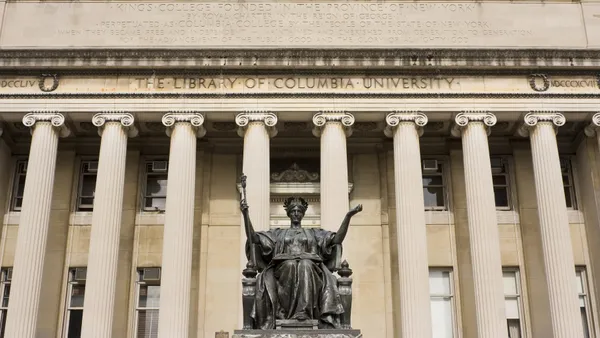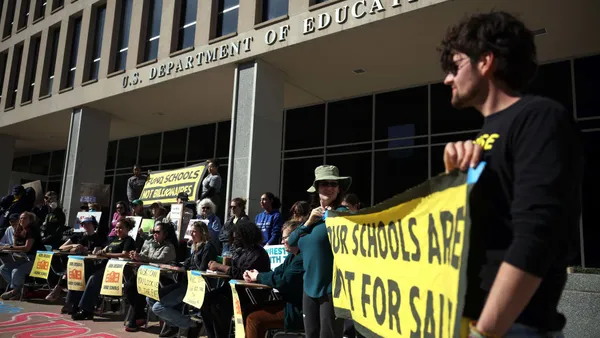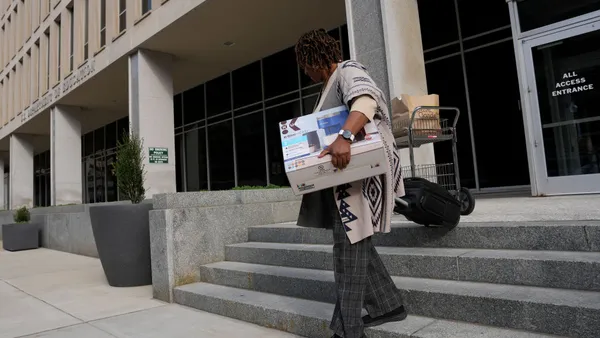Dive Brief:
- The American Association of University Professors on Wednesday endorsed the use of diversity, equity and inclusion statements in academia and rejected the idea that including DEI criteria in faculty evaluation is antithetical to academic freedom.
- Colleges should include faculty in all stages of DEI policy development, implementation and revision, the organization said in its policy statement.
- They can also use DEI metrics when asking faculty to demonstrate the skills needed to reach institutional diversity goals, which the statement said are "closely connected to academic freedom and shared governance.”
Dive Insight:
DEI statements, which outline job candidates’ experiences with and commitment to diverse student populations, have been relatively common in higher education in recent years. But conservative policymakers and some free speech advocates have increasingly targeted the statements.
Supporters say DEI statements center diversity in a majority-White profession and can help campuses become more welcoming to a wider spectrum of people. Detractors assert that such statements infringe on faculty's free expression by mandating certain ways of thinking.
AAUP's statement represents one of the country's largest faculty groups weighing in on the hotly contested topic. It hit back against critics of DEI statements Wednesday, arguing they “often conflate social and institutional values with imposed orthodoxies.”
"Sweeping or abstract criticisms of DEI criteria fundamentally — and often deliberately — misunderstand and misrepresent this distinction," the group said.
Under AAUP's new guidance, academic groups like departments can evaluate faculty under policies and goals the individuals disagree with. In turn, individual faculty members have the right to express their dissent, the group said.
AAUP said colleges have a mission to address inequality through teaching and research. Asking, or requiring, faculty to consider how their actions affect this goal can help institutions promote a culture of diversity.
"When implemented appropriately in accordance with sound standards of faculty governance, DEI criteria — including DEI statements — can be a valuable component in the efforts to recruit, hire, and retain a diverse faculty with a breadth of skills needed for excellence in teaching, research, and service," AAUP said.
DEI work should be assessed as part of faculty members' core duties "rather than tacked on as a separate criterion of evaluation," the group added.
AAUP addressed lawmaker efforts to ban diversity statements, as well as broader attempts to censor educational speech in college classrooms.
"Debates about the appropriateness of DEI criteria cannot be understood in isolation from the current political context of higher education in the United States," it said. "Wholesale opposition to the use of DEI statements has often gone hand in hand with partisan legislative and other efforts to restrict or ban certain subjects of research and teaching — especially in fields and disciplines that expressly address histories of inequity."
Some attacks have gained national attention, such as a Republican-sponsored House bill that would have banned federally funded colleges from requiring DEI statements. So far, the legislation has not advanced.
But system- and state-level actions have continued to gain traction.
In December, Oklahoma's governor signed an executive order banning colleges from requiring prospective employees to include diversity statements in their applications.
Utah’s Legislature passed a similar policy in January that prohibits colleges from asking prospective hires or students about their views on DEI. The bill's authors described diversity statements as ideological litmus tests.
And the University System of Georgia last year barred its 26 institutions from requiring applicants and employees to fill out what it describes as “affirmations, ideological tests, and oaths."















